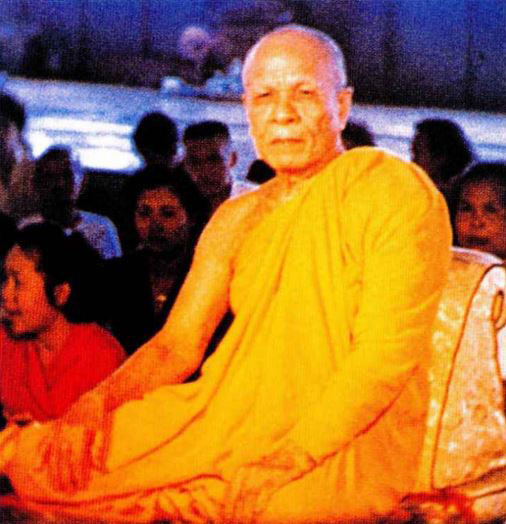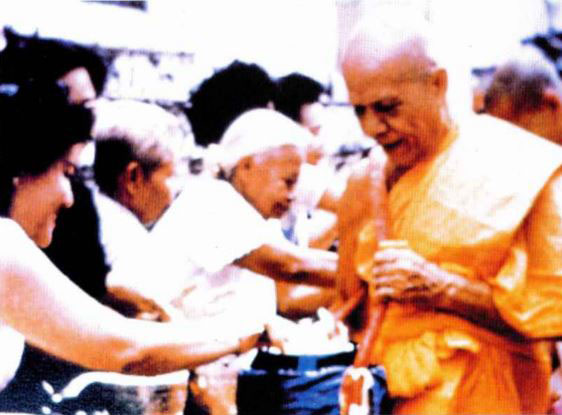
Luangpu faced many obstacles during his early tenure as Abbot of Wat Paknam. The resident monks and laypeople there were so accustomed to their unruly ways that they resisted all attempts to establish order. Monks and novice monks did not live by the monastic rules of discipline. Many of them had developed undesirable behaviors. The new rules and changes that Luangpu put in effect not only upset the monks and novices under his charge but also the locals who were long used to illicit dealings through the temple. They turned against him and spread mud-slinging gossip to discredit him. Some even tried to harm him physically.
One night eight men came along with the intention of disposing of Luangpu. One of the monks on watch tried to stop them. Hearing the commotion, Luangpu went out to see what was going on. Upon seeing what happened he said to the monk, "We bhikkhus must not fight nor run away. Only in this way will we prevail." The compelling presence of Luangpu must have caught the men off guard. They backed off into the darkness.
On another night, at about 8 p.m., as Luangpu was leaving the sermon hall to return to his living quarter, an assassin fired two shots at him. The bullets ripped through Luangpu's robe and hit the face of a lay supporter by the name of Prom who was walking behind Luangpu and fatally wounded him.

Luangpu's robe had two large bullet holes in it, but Luangpu himself was unscathed. Usually, monks' robes are worn tightly against the body. The fact that two bullets went through Luangpu's robe but did not even touch his skin was nothing short of a miracle. Did Luangpu possess supernatural power? Was it due to the virtue of the Dhammakaya that gave him this power? Or was it because of merit power from the good deeds that he practiced which protected him from harm? Regardless of what it was, the incident made Luangpu famous. The police soon arrived on the scene. They took away the tatters of Luangpu's robe as evidence and later caught the culprit, a local villain named "Rod". Later Luangpu was called to testify in court. He attended the trial without carrying any animosity toward his attacker. He even appealed to the magistrate to lighten the sentence of the accused. His kindness was felt by all.
Luangpu's problems were not only confined within the temple grounds. When Luangpu newly accepted the position of Abbot at Wat Paknam, the monastic head of Bhasicharoen sub-district prohibited him to display extraordinary mental powers for fear of offending abbots of other temples in the area. Luangpu took no notice of this directive. He expressed his view: "Asking one to sit idle, not doing something useful for oneself and others, is asking one to let his life be barren."
Luangpu's vocation was not without hindrances. The impact of the Dhammakaya meditation was widespread, causing a stir among those used to other Buddhist practices. References to Dhammakaya in the Theravada Buddhist Canon were scant, not enough to give light to unfamiliar people. Luangpu found himself confronted by many people who believed that his meditation method was alien to Buddhism. Some monks thought that he had meditated too much and as a result was teaching something that was not in keeping with Buddhism.
At first sight Luangpu's teachings didn't seem to correspond with those recorded in the Pali Canon. But, in truth, the depth of insight that he had gained through inner wisdom made his Buddhist teachings very precise. Ironically, he received a continuous stream of complaints from a public long used to vague generalizations on Buddhism. Luangpu, like any pioneer, had to treat these prejudices as just another obstacle to overcome. It was only much later that his teachings would be embraced by the public.
As for the Dhammakaya Knowledge that he propagated, early on, people accused him of inventing the name "Dhammakaya". Some accused him of self-proclaiming supernatural powers. Some even went so far as saying, "Those who want to become demons go to Wat Paknam to practice Dhammakaya."
Luangpu responded with these words:
"It is pitiful. These people speak out of ignorance. How could one dream up a name like this without the knowledge of its origin? Pay no attention to this kind of shallow thinking. Dhammakaya is the real thing. This real thing will propel Wat Paknam to great heights. Just wait and see."
On one occasion Luangpu discussed with Somdej Phra Wanarat of Wat Phra Chetuphon1 the allegations which so many people had levelled against him (1Somdej Phra Wanarat of Wat Phra Chetuphon later became the Supreme Patriarch of Thailand). He said :
"A person like me is not one who lacks wisdom, knowing not what is right, what is wrong. Why should I destroy myself by indecent aspiration? They accuse me because they have no knowledge about Dhammakaya. They know neither the place where Dhammakaya exists, nor the meaning of the word itself. This ignorance caused them to jump into wrong conclusion and blame someone who is forthright. No ignorance can wipe away Truth. Good will always overcome evil. The Dhammakaya of Buddhism is the real thing. It is not fake or artificial. Eventually, the light from the jewel of Buddhism will brighten their eyes, enabling them to see the Truth for themselves. The results of the truth are derived from the meditator's own experience, not from doctrinal study. I am not upset by all this controversy because Dhammakaya is the truth of Buddhism. It is real. Dhammakaya will appear to all those who attain to that level of consciousness. My conviction in the veracity of Buddhism is unshakeable."
"At Wat Paknam, the monks in my care, even when eating and sleeping, do nothing in their lives but practice meditation. We talk together about what we have achieved and we are tireless in encouraging others to do good. We do not advertise ourselves in newspapers. Our fame relies solely on our good reputation. But even in spite of the virtue of our temple, people still come to slander."
He quoted the Buddha's Teaching to his disciple Vakkali2 (2Vakkali: one of the arahants who had obtained enlightenment through faith and love for the Buddha):
"Yo kho Vakkali Dhammam passati so mam passati"
"Vakkali, whoever sees Dhamma, sees me".
And another one to the novice Vasettha:
"Tathagatassa h'etam Vasetthadhi-vacanam Dhammakayo iti pi..."
"O Vasetthas! The word of Dhammakaya is indeed the name of the Tathagata3" (3Tathagata: the Accomplished One, the supreme man, the superlative man, referring to the Buddha. The exact meaning of this Pali word is "He who has reached or become what is really so, the True", the term the Buddha used to refer to himself after the Awakening.).
Like many great men and pioneers of the world whose wisdoms and visions were beyond the grasps of other fellowmen, Luangpu had to swim upstream in order to overcome the lack of understanding and awareness of his fellowmen. But in the long run he prevailed. Wat Paknam under his guidance evolved to become the most accomplished and venerated Buddhist temple in Thailand. Today, Dhammakaya Meditation is one of the most popular meditation techniques in Thailand.